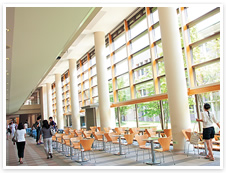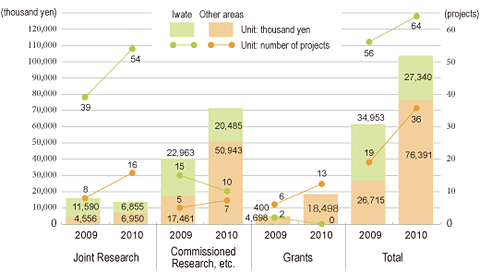- Contributions to the Local Community as a University of Iwate
- Contributions to the Local Community Through Industry-University-Government Collaborations, Research Activities, etc.
- i-MOS Research Topics
- Regional Policy Research Center: Topics for “Earthquake-Tsunami Disaster Reconstruction Research”
 In order to realize the philosophy of "a university that contributes to creating vitality in the local community," our university is engaged in various activities with the Regional Cooperation Head Office at the university acting as the core organization.
In order to realize the philosophy of "a university that contributes to creating vitality in the local community," our university is engaged in various activities with the Regional Cooperation Head Office at the university acting as the core organization.
In 2010, our university was not only active in establishing the "Iwate Monodukuri and Software Integration Technology Center (i-MOS)" and "Regional Policy Research Center," which were introduced in the previous section, but we also hosted communication conferences and research groups for promoting built-in technologies, dispatched our faculty members to the Tohoku Built-in Industry Cluster, conducted "open local issue research" aimed at resolving local issues, and hosted study groups on inter-regional disparities at Miyako College.
In addition, we have also been hosting forums, etc. so that more Iwate residents can understand our university's local contributions. We also participate in the "School Collaboration Activity Project" at Takizawa Village and host open lectures so that our intellectual properties can better serve the local communities.
 Our university has been actively promoting joint research and commissioned research as part of being a liaison between the university, industry, and the government. This liaison was formed so that industries and local governments can work together to tackle local issues and nurture local industries. Compared to the previous year, 2010 saw an increase in the number of joint research projects, both within Iwate and outside the prefecture. We expect joint research projects, such as those utilizing i-MOS, which was newly established in 2011, to become even more active in the future.
Our university has been actively promoting joint research and commissioned research as part of being a liaison between the university, industry, and the government. This liaison was formed so that industries and local governments can work together to tackle local issues and nurture local industries. Compared to the previous year, 2010 saw an increase in the number of joint research projects, both within Iwate and outside the prefecture. We expect joint research projects, such as those utilizing i-MOS, which was newly established in 2011, to become even more active in the future.
With regards to outside funding, we were selected for the 2010 JST Social Technology Research and Development Project. In addition, out of 61 applications for scientific research grant, 11 applications were approved. We will continue to put efforts into supporting the application process.
Furthermore, we hosted 26 public lectures for the residents of Iwate, mainly at Takizawa Campus and Iwate Prefecture Citizen's Cultural Exchange Center Aiina Campus at the west entrance of Morioka Station, which garnered 2,946 participants, and we will continue to actively pass on our intellectual properties gained through our research, etc. to the people of Iwate.
|
|
The following 9 projects were selected as the 2011 Iwate Monodukuri and Software Integration Technology Center (i-MOS) research topics.
| No. | Proposed by | Proposed Theme | Faculty in Charge |
|---|---|---|---|
| 1 | Yoshitoshi Murata | Development of a measurement system for rehabilitation improvement rates | Faculty of Software and Information Science |
| 2 | Yoshikazu Arai | An intelligent brake control system that takes discontinuous information transmission in communications between vehicles into consideration | Faculty of Software and Information Science |
| 3 | Akihiro Abe | Research on the comprehensive support system for local tourism based on the analysis and visualization of travel behavior data | Faculty of Software and Information Science |
| 4 | Jun Sawamoto | Research on safe driving support systems using brainwave information | Faculty of Software and Information Science |
| 5 | Toshimitsu Inomata | Development of a quality inspection support system for built-in software | Faculty of Software and Information Science |
| 6 | Akio Doi | Establishment of a real-time display environment for large-scale multi-volume images using tiled display and a basic study on next-generation visualization systems | Faculty of Software and Information Science |
| 7 | Masakazu Soga | Method of providing safe driving support information catered towards elderly drivers (prevention of gas-break mix-up) | Regional Cooperation Office |
| 8 | Kotaro Shibuya | Development of methods for extracting ingredients such as essential oils from plants in Iwate and research on the effects of the essential oils, etc. | Faculty of Policy Studies |
| 9 | Goutam Chakraborty | Research on collection and analysis of shoe-pressure sensor data to detect walking faults, balancing problems, and for other applications | Faculty of Software and Information Science |
The following topics were selected for the 2011 "Earthquake-Tsunami Disaster Reconstruction Research" at the Regional Policy Research Center. With a total of 15 topics, 4 of which are in the life field, 6 in the industrial economy field, and 5 in the social/lifestyle infrastructure field, we are promoting support for reconstruction efforts.
| Field | Research representative | Research topic | Affiliated faculty |
|---|---|---|---|
| Life field (4 topics) |
Munetaka Kurahara | Hands-on research for forming a well-connected community to establish reconstruction plans and building a new regional society | Faculty of Policy Studies |
| Akiko Ogawa | Prevention of social isolation in affected areas and creation of lifestyle-support type communities | Faculty of Social Welfare | |
| Takako Otoki | Rebuilding culinary culture through the participation of survivors in Noda Village with image maps - An attempt to design the direction of the future dietary habits of Iwate residents | Morioka Junior College | |
| Yoshiro Miyagi | Basic study on combined welfare bases in affected areas | Faculty of Social Welfare | |
| Industrial economy field (6 topics) |
Tomohiro Kaneko | Issues surrounding economic reconstruction in affected areas - A study through the analysis of current economic difficulties faced by small- and mid-sized companies - | Faculty of Policy Studies |
| Tajima Kuwada | Critical research on restructuring the special fishing districts and fishing ports based on the interests of recovery and reconstruction of the fishing industry in Iwate - Focus on the situational analysis of fishermen, fisheries cooperative associations, and federal/prefectural/municipal governments - | Faculty of Policy Studies | |
| Hideki Yoshino | Study on the reconstruction of tourism in the coastal region of Iwate and creating jobs | Faculty of Policy Studies | |
| Masahiro Ueda | Restructuring of the "Monozukuri industry" in affected areas and the possibility of new locations | Miyako College | |
| Shinichiro Aoki | Rebuilding the industrial economy by providing mental health support to workers in affected areas | Faculty of Social Welfare | |
| Yoshinobu Nitta | Identifying the conditions for recovering/reconstructing the fishing industry cluster | Faculty of Policy Studies | |
| Social/lifestyle infrastructure field (5 topics) |
Kotaro Shibuya | Research on protecting earthquake heritage, etc. for the designation of Sanriku Reconstruction National Park and Sanriku Geo-park, plans for the facilities to be used in the national park (infrastructure), and training of earthquake storytellers (Geo-park guides) | Faculty of Policy Studies |
| Koji Abe | Research on residents' awareness during the reconstruction process in affected areas | Faculty of Policy Studies | |
| Hideyuki Ito | Development and implementation of local reconstruction / disaster prevention educational programs from a mid- to long-term perspective | Faculty of Policy Studies | |
| Toru Kanou | Improvement of temporary housing and proposals for creating communities in temporary housing areas | Faculty of Social Welfare | |
| Mihoko Uebayashi | Actual conditions of affected home-care patients and the direction of disaster prevention training activities | Faculty of Nursing |




